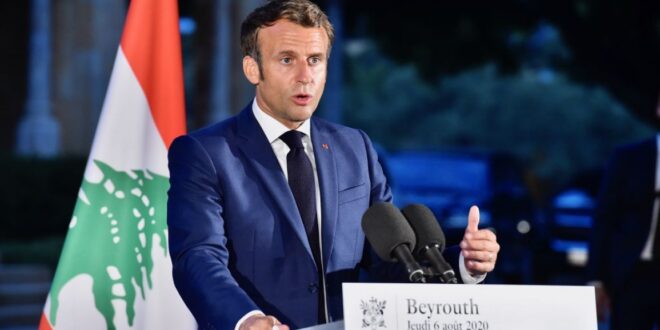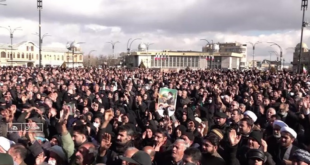When French troops disembarked at the port of Beirut in September 1920, intent on dissolving the short-lived Arab government, they were met by welcoming crowds of local Maronites and members of Lebanon’s smaller Christian sects. Amidst a sea of French flags, these groups hailed France as “al-umm al-hanuni” – their “tender, loving mother” in Arabic.
Eighty years since Lebanon proclaimed independence, on 22 November, 1943, France’s sense of neo-colonial maternalism endures. Since that date, a cornerstone of French foreign policy in Lebanon has been to patronise various political-sectarian factions while turning a blind eye to elite misconduct.
This misguided approach has, however, helped to facilitate Lebanon’s devastating descent into financial and political chaos in recent years.
''Intrinsic to Franco-Lebanese ties is a willingness from the Élysée to put up with the misbehaviour of Lebanon’s political establishment in exchange for a French foothold in the country. Strategically, from the vantage point of Paris, Lebanon serves as a small but important bridge linking Europe’s southern flank to the wider Middle East.'' On the surface, Lebanon has never been France’s main geopolitical priority in the Middle East, while simultaneously it has maintained a curious relevance at the Élysée Palace. The relationship between these countries is partly born out of French colonial nostalgia for the ‘Paris of the Middle East’, while Lebanese receptivity is equally shaped by the largely peaceful departure of French forces in the 1940s. Amidst the recent precipitous decline of French power in West Africa, alongside its more gradual erosion in North Africa, Lebanon stands as one of the few surviving examples of admittedly fragile post-colonial goodwill towards France.
Presidential interests
The result is a bilateral relationship navigated according to the personal interests and political outlook of each French president. During Lebanon’s protracted and bloody civil war, spanning from the 1970s through to the early-1990s, the French government presented itself as an ardent protector of Lebanon’s Maronite Christian population, and as willing to put up with the depravities of their militias. With the close of the civil war, French foreign policy shifted to align with Lebanon’s ascendant Sunni political faction of the 1990s. This was underpinned first and foremost by the personal friendship, and political alliance, between French President Jacques Chirac and Lebanese Prime Minister Rafik al-Hariri. In fact, the two were so close that Chirac moved into the Hariri’s Paris apartment during his retirement.
Today, French President Emmanuel Macron has followed in the footsteps of his predecessors and once again re-aligned Paris’ political-sectarian positioning in Lebanon. In a foreign policy approach spearheaded by presidential advisors in the Élysée Palace, vis-à-vis the Ministry for Foreign Affairs, France is presently one of the only European states sharing avenues of dialogue with the dominant force in the Lebanese political landscape: Hezbollah.
This approach has come in parallel with a particularly fraught time in Lebanese politics. A political impasse has left Parliament unable to elect a new president since October 2022, with the country’s unwritten National Pact mandating the president be a Maronite, the prime minister Sunni and the speaker of parliament Shia.
France’s entrée into the debacle came with Macron’s support for Lebanese presidential candidate Sleiman Frangieh, a Maronite figure publicly backed by the leadership of both Hezbollah and Amal, the country’s largest and second largest Shia-based parties. Their support for Frangieh rendered his campaign highly controversial, particularly amongst traditional Maronite political parties, including the Lebanese Forces, the Free Patriotic Movement, and the Kataeb, who staunchly oppose further entrenching the Hezbollah-Amal political alliance within Lebanon’s executive branch.
Indeed, during the 12th and latest parliamentary attempt to elect a Lebanese president in June 2023, an unlikely alliance of Maronite political parties and anti-establishment opposition figures ensured Frangieh secured only 51 votes, falling well short of the 86-vote threshold for his election. In the absence of a consensus candidate, Lebanon remains tethered to an immobilised caretaker government that is incapable of passing legislation.
Intrinsic to Franco-Lebanese ties is a willingness from the Élysée to put up with the misbehaviour of Lebanon’s political establishment in exchange for a French foothold in the country. Strategically, from the vantage point of Paris, Lebanon serves as a small but important bridge linking Europe’s southern flank to the wider Middle East. For example, although wooing the Gulf states was one of President Macron’s key priorities in the region in recent years, Lebanon kept its spot on the agenda in his diplomatic endeavours through 2022.
Financial crisis
Meanwhile, since the onset of Lebanon’s cascading financial crisis in 2019, described by the World Bank as amongst the most severe in global history, French multinational corporations have scooped up major contracts across the country. Specifically, French fossil fuel titan, TotalEnergies, currently spearheads a consortium engaged in natural gas exploration at several locations off the Lebanese coast. Initial exploration has not yielded any finds, however, TotalEnergies has also shored up purchases across Lebanon’s renewable energy sector.
French shipping giant CMA CGM has also secured near total dominance over Lebanon’s import-export infrastructure after acquiring 100% ownership and management rights of the ports in Beirut and Tripoli. Rudolphe Saadé, the current CEO of CMA CGM and son of its Lebanese founder, Jacques Saadé, is a close advisor of President Macron.
In February 2022, CMA CGM won the tender to run the container terminal at the Beirut port in a bidding process which has since been criticised for a lack of transparency. In swiftly allocating the tender to CMA CGM, Lebanon’s Ministry of Public Works did not wait to complete the new master plan for the port’s redevelopment or draw up and implement proposed legislative reforms.
More recently, the holding company of CMA CGM, Merit Invest, also won the tender to operate Lebanon’s domestic postal service, before having it dismissed following criticisms levelled by the Lebanese Court of Audit. The court raised similar concerns to those regarding the Beirut Port, namely that the Ministry of Telecommunications’ tender process had been rushed and structured to favour Merit Invest’s bid.
In the aftermath of the catastrophic 4 August blast at the Beirut port in 2020, the CEO of CMA CGM accompanied the French President on a visit to the site of the disaster. During this state visit, Macron delivered a seemingly firm scolding to members of the country’s political class. This included threatening sanctions unless the Lebanese government passed the legislative reforms required to access a US$3 billion rescue plan from the International Monetary Fund (IMF).
Three years later, these reforms are nowhere to be seen and the failure of the Lebanese political class to act on Macron’s warnings has gone largely unpunished.
French sanctions imposed on Lebanese figures in 2021 for alleged financial corruption or obstruction of financial reforms were meagre. The names of the individuals targeted were kept secret, and the only “sanctions” they faced were entry restrictions into French territories. There has since been no progress on an IMF deal and the makeup of Lebanon’s political elite remains the same – with the notable exception of disgraced former Central Bank Governor, Riad Salameh, who faces international arrest warrants.
Betraying the people
The frailty of French sanctions on the wider Lebanese political establishment, who had until recently helped successfully protect Salameh, has served as benchmark for the pitiful accountability measures imposed by the wider international community.
One might easily see the contours of a French-Lebanese quid pro quo for Lebanon’s elites. In 2020, Human Rights Watch reported persistent obstruction by the French in international efforts at the United Nation’s Human Rights Council for an investigation into the Beirut blast. Given Macron’s promises for unconditional justice following the explosion, claiming “I’m not here to help them, I’m here to help you” whilst speaking to victims in Beirut, this obstruction is nothing short of a betrayal.
Since 2020, domestic investigations have hinted at the matrix of public officials, interwoven into Lebanon’s prevailing political power structure, whose gross negligence set the conditions for the blast to occur. Importantly, various factions of the political establishment – in particular, Hezbollah – are also heavily implicated in concurrently quashing domestic investigations.
The 80th anniversary of Lebanese independence therefore arrives at a critical juncture. It should prompt the Élysée to pause and reflect on France’s current role in Lebanon.
The appointment of political heavy weight, Jean-Yves Le Drian, as the new French presidential envoy to Lebanon in June 2023, suggests the terms of French engagement may be undergoing a tactical shift. During his most recent visit to the country, Le Drian met with parliamentarians from across the political spectrum, signalling an openness to back an alternative presidential candidate to Frangieh. At the same time, Le Drian’s repeated threats of sanctions have gone nowhere, not least in terms of the empty EU sanctions framework now in its third year without one sanction being issued.
France’s present approach of tolerating and enabling the stark misgivings of Lebanon’s establishment, waving around empty threats and vying for contracts for its companies, has proven fateful for Lebanon’s populace. A first step out of both the political and the financial crises would be tough talk backed by action, not a pat on the back, by the Élysée.
The backroom dealings over the presidency and public sector assets that have become the norm for French manoeuvring in Lebanon should be replaced by the implementation of stringent, targeted sanctions against the members of the political elite blocking a resolution of the country’s political and financial crises. Only this approach can compel Lebanon’s political factions to settle on a successor to President Michel Aoun. In the meantime, the threat of the naughty step just won’t do: Ça suffit monsieur le president.
 Eurasia Press & News
Eurasia Press & News




